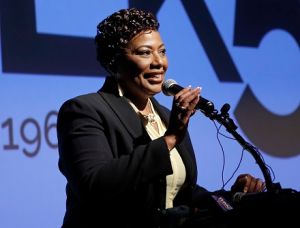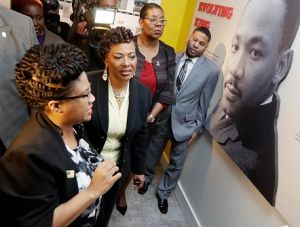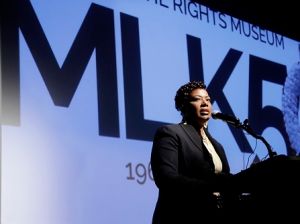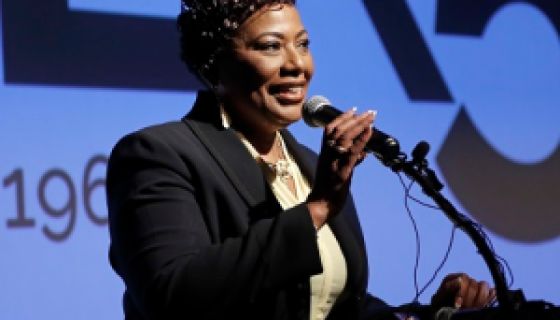Bernice King Tours MLK Exhibit At The National Civil Rights Museum

Rev. Bernice King
MEMPHIS, Tenn. (AP) — Bernice King stared with purpose at the video of her father, the Rev. Martin Luther King Jr., concentrating on the tired look in his eyes as he spoke to reporters in the days before he was gunned down at a motel in Memphis, Tennessee.
She was touring a new multi-media exhibit Monday at the National Civil Rights Museum — located at the site of the old Lorraine Motel, where her father was shot — when she stopped at the old newsreel. King was only 5 when her father was killed on April 4, 1968, while supporting a sanitation workers’ strike in Memphis. Still, she noticed something different about her dad, whose popularity had waned after fighting for years for racial and economic justice.
“I could sense that he was weary and tired,” Bernice King said. “It looked like he was here but not here. When I looked at him other times, he seemed a little bit more vibrant in his eyes. But it almost seemed he was at a place of almost like, resignation.”
Her visit to the museum is one of several events taking place this week to commemorate the 50th anniversary of King’s assassination, which is Wednesday. Museums, colleges and activists have organized three days of marches, speeches and conferences to remember King and his legacy. Her museum visit came after a speech by former U.S. Attorney General Eric Holder at the Peabody Hotel during a symposium sponsored by the University of Memphis and the museum.
Bernice King walked slowly among the photos, videos and historical accounts that are part of the new exhibit opening to the public Wednesday. Museum officials say the exhibit, which featured photos by Ernest Withers and Art Shay, ties together King’s experiences leading the civil rights movement with present events, such as protests by the Black Lives Matter movement.

Rev. Bernice King, second from left, daughter of the late civil rights leader Rev. Martin Luther King Jr., tours an exhibit at the National Civil Rights Museum
The exhibit includes photos of his viewing at a Memphis funeral home and the silent march that took place days after the assassination. It also has a timeline of King’s final days and a clock that reads 6:01 — the time in the afternoon that he was shot.
King told reporters that if her father were alive, he would not be shocked or surprised about the racial, social and economic polarization seen today in the United States. Her father would say that society needs to root out the vestiges of institutional racism, “where we don’t value people the same,” she said.
“When I think about some of the policies that we make in this country, the policies are so self-driven,” she said. “For me personally, it’s on both sides of the aisle. We have not found a way collectively to create a policy that transcends party. Daddy was speaking to all that.”
Earlier Monday, Holder, the first black U.S. attorney general, made two thinly veiled references to President Donald Trump as he addressed politicians, activists, judges and community leaders during his luncheon speech. Holder was appointed attorney general by Barack Obama, the nation’s first black president and Trump’s predecessor.
Holder said he is proud that the nation has made progress in the past 50 years achieving racial, social and economic justice. He said women, minorities, students against gun violence and members of the LGBTQ community have been inspired by King’s nonviolent protests and have launched movements calling for “fairness, opportunity and justice.”
But in remarks that appeared to reference Trump without mentioning his name, Holder also noted that King’s dream of equality for all has not been reached.

Rev. Bernice King, daughter of the late civil rights leader Rev. Martin Luther King Jr., speaks at the National Civil Rights Museum
“We’re still marching, we are still striving, and we’re still calling on our nation’s leaders to act with a sense of justice, compassion and common humanity,” Holder said. “The unfortunate fact is that in 2018, America’s long struggle to overcome injustice, to eliminate disparities and eradicate violence has not yet ended, and the age of bullies and bigots is not fully behind us.”
Holder said he is concerned with gun violence, the disproportional incarceration of young black men, and uneven educational opportunities for minorities. King’s legacy includes the lesson that “it is necessary to be indignant, and to be impatient, so that it impels us to take action,” Holder said.
Holder said the “chief civil rights issue of our time” is ensuring minorities have equal voting rights.
“In many communities, our political system is far from fair,” said Holder, who chairs the National Democratic Redistricting Committee, a group that is pushing back against gerrymandered political districts nationwide. “It’s been undermined by spurious and outright false claims of widespread voter fraud and by acts of voter suppression.”
Holder asked the crowd of hundreds to do more to help realize King’s dream of racial and social equality and come together to “heal this divided nation.”
“As easy as it is, we must not look back to a past that was comforting to too few, and unjust to too many,” Holder said.
Then, in a reference to Trump’s campaign slogan, he added: “That is not how we make America great.”
READ MORE STORIES ON BLACKAMERICAWEB.COM:
- Black Teen Saniyah Cheatham Dies While In NYPD Custody
- TV One & CLEO TV Celebrate Black Culture & Flavor At Essence Eats
- Naomi Campbell Slayed The Balenciaga Paris Haute Couture Fashion Week Show Like The Icon She Is
GET THE HOTTEST STORIES STRAIGHT TO YOUR INBOX:
(AP Photo/Mark Humphrey)

















